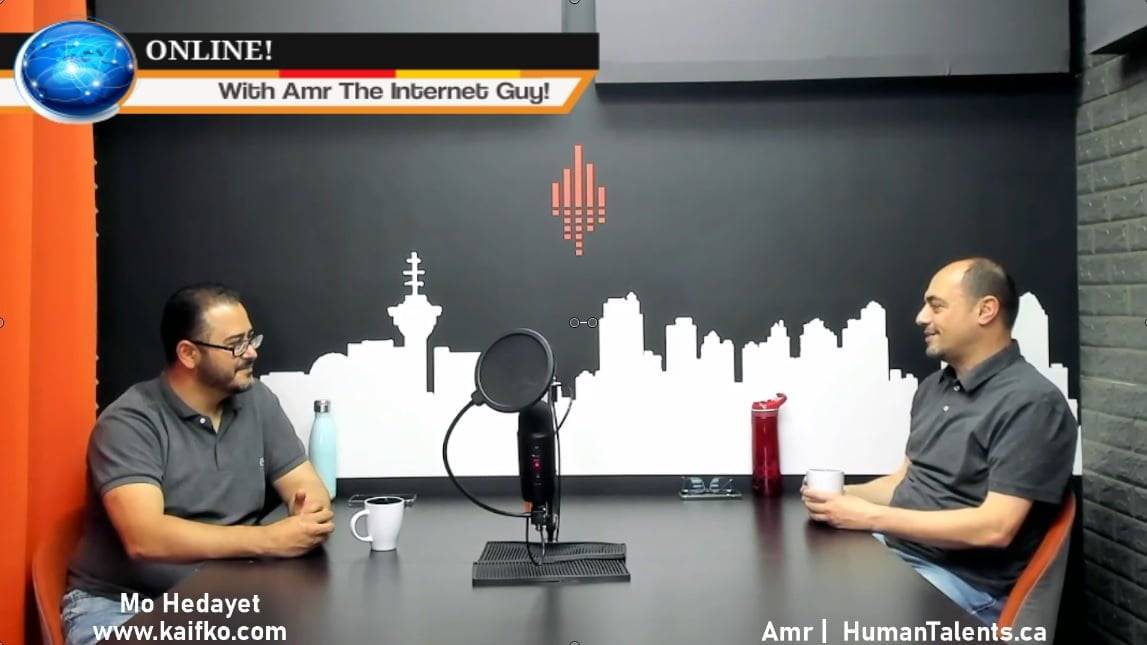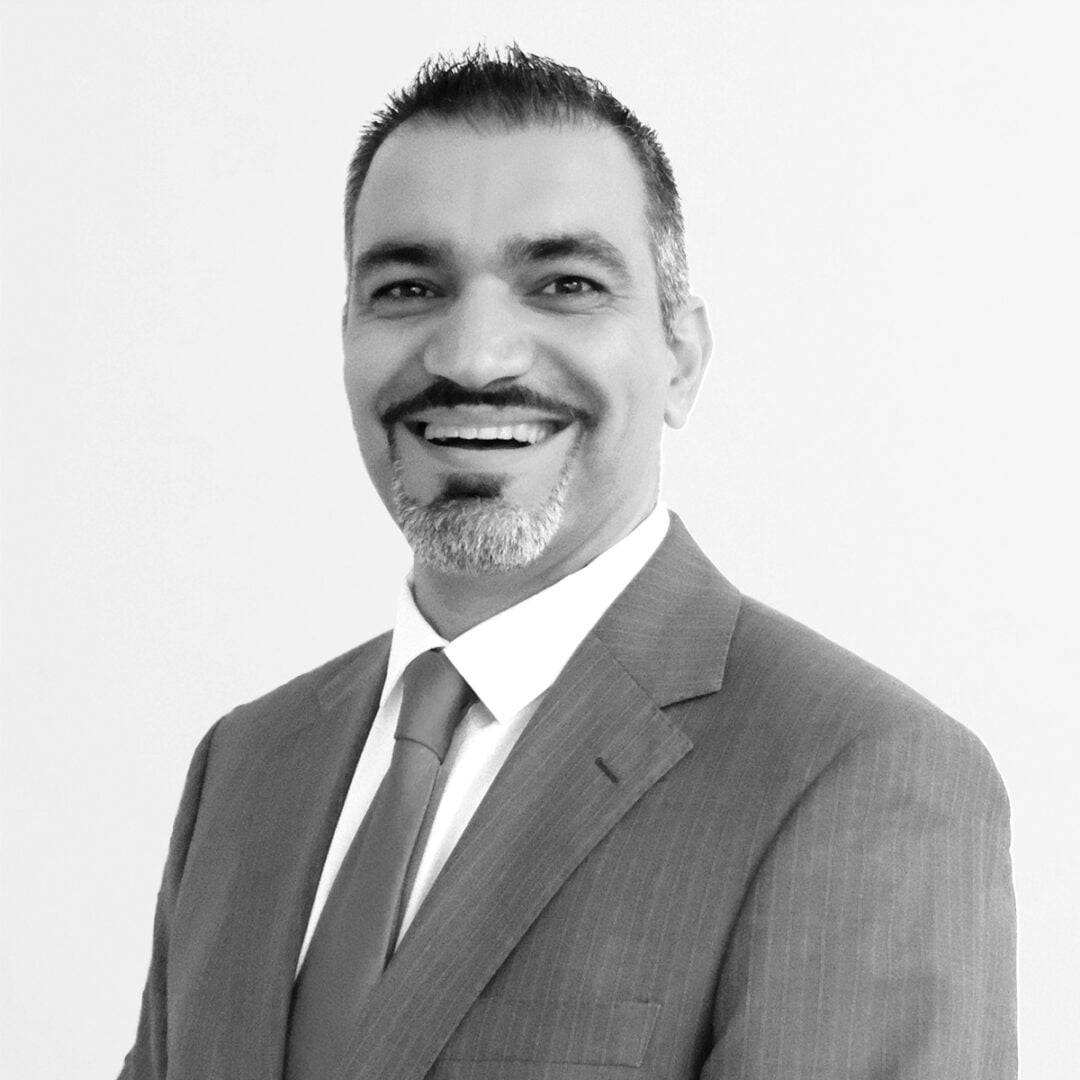Online With Amr The Internet Guy!
EP13: Write Right with Leandre Larouche – How to Write Quickly, Painlessly, & Effectively

Online! Episode 13:
In this episode, we are discussing writing, not just any writing but writing a book! Oh yes writing a “book” 🙂
Why? We’ll get to that in a bit!
My Guest from Quebec is Monsieur/Léandre Larouche.
An avid writer, publisher, podcaster, and writing coach. He helps people write and publish a book in 16 weeks, and to fall in love with the process of writing.
There is more than one reason why anyone would write a book, especially if you are an entrepreneur!
Here are a few:
- Share your knowledge and wisdom with the world
- Do something that makes you happy
- Position yourself as the subject matter expert you are
- Growing your Business/Audience
- Become Unforgettable
So, if you are (like me) scared of writing in general, are stuck in writer’s block! Or unsure about wirting, this podcast episode is for you.
Everyone can learn to Write Quickly, Painlessly, & Effectively.
Enjoy!
Video Contents
1:30 Start and Introduction
4:28 Sorting out the Chaos, get your writing coached
6:30 80% of people want to write a book
9:27 1000 reasons to write a book
15:08 Ghostwriting and when it makes sense
22:56 Free isn’t always the best
30:17 4 Parts of all writing
34:00 Stoicism, Writing, and Websites
How to get in touch with Léandre:
Websites: www.triviumwriting.com
www.leandrelarouche.com
Instagram: @leandre_larouche
https://www.linkedin.com/in/leandre-larouche/
This Podcast is available at your favorite Podcast/Streaming network including Spotify, Google Podcasts and iTunes.
Online! Episode 13 Video:
Episode 13 Transcription:
Amr The Internet Guy:
Hi, guys, and welcome to another episode of online. Do you know sometimes when we discuss digital marketing or marketing in general, we talk about credibility, we talk about positioning yourself as the expert in your business, in some circles, they will tell you that publishing your own book with you, as the author would actually enhance your credibility and marketability. But that’s not the only reason that some people could be exploring the idea of writing a book. Maybe you just want to share your wisdom and your experience with the world. And you think that the book format is the best way to go. And that’s the best thing that your readers or your prospect customers or the people you’re trying to reach, would prefer. So this idea for me was completely new, and I wanted to learn more. I interviewed a great author, publisher and writing coach, Mr. Leandre Larouche He’s from Quebec, but I think he lives in Ontario. So without further ado, let’s hear from Leandre. Hey, guys, today I have a special guest, Mr. Leon LaRoche, from Quebec. So I’m finally in Quebec. I think last time I reached up to Toronto, and I stopped. So this time I went all the way east. So Leon, please tell people like a little bit about who you are and what you do,
Leandre Larouche: for sure. So I am a writer by profession, I studied English literature and professional writing. So like you said, I’m from Quebec, originally. And so my mother tongue is actually French. And so I started writing it around, at around age 50. And growing up, I was utterly obsessed with the English language. So I thought, you know, it’d be cool to be a writer, but it’d be even cooler to be a writer in English. And so I studied the English language obsessively. And so I started writing, writing in English. And when I was in university, I had the great opportunity to work as the writing assistant at the at the Writing Center. So that allowed me to help hundreds of people with the writing, so whether for homework, papers, or personal statements, and so that really gave me the desire to to help people with their writing. And that also made me notice how needed writing, coaching and cheering is. And so after university, I decided to become a writing coach. So using all the skills that I had developed, and so to teach people how to write books. So I have published a book myself in 2017. And so my goal, in essence, is really to teach people the fundamentals of writing to teach them good writing, and make them realize that writing isn’t as hard as, as we are, as we are told, and that’s we’re led to believe. And so, really, my purpose is to make writing simple for most people for the average person. So that’s a little bit about who I am.
Amr The Internet Guy: Wow. So you’re you’re we’re trying to convince people that writing is easier. Right?
Leandre Larouche: Exactly. Well, I mean, I show them that it is easier frameworks through methods that I’ve that I’ve developed. I don’t I don’t expect people to believe me when I say that it is easy. But my my goal is really to show them the ways of looking at writing that makes them that makes it easy. Nice.
Amr The Internet Guy: I have like 1 million questions right now. So I need to organize my thoughts, so that our audience can get something out of this podcast. But the first thing is is like coaching about writing, I haven’t met someone who does that. So it’s basically you want to coach people to write better? Is that is that? A true? Yes.
Leandre Larouche: The first thing that I that I coach people with is the mindset. So the kind of mindset that you need to have in order, right? People have all sorts of blocks. When it comes to writing. Sometimes they believe that our ideas, their ideas aren’t worth writing about or that people wouldn’t want to read them. Or sometimes people are just, you know, they’re confused and their ideas are messy in their mind. And so what I coach them To do well, first thing to, to believe in their ideas and themselves, and then second to take the chaos in their mind and put it on paper in a way that makes sense for the for the reader, because that’s really the first thing if you can achieve that if you can write with clarity, that’s already a great start. Now, I also help people write better, like stylistically. So I teach them, you know, what makes for good writing? What makes for bad writing? And so they can differentiate if they’re writing, if the writing well or not. But so these are, these are the big things that I that I help people with.
Amr The Internet Guy: What kind of I’m thinking like, how would someone know that? They want to write? Like when? Okay, think about your clients right now, when they contact you the first time, what do they say? Like, how, what were they looking for? And then they found you.
Leandre Larouche: Yeah, most people that that become clients, when we meet, they are either trying to get started. But most of them, they are really just thinking about, they’ve had this idea for like, five, sometimes 10 years, or even more, a lot of the people that I work with, it’s like, they’ve known for almost their entire life, that they have a book inside of them. But they’ve had these limiting beliefs that made them either procrastinate or just not decide to do it. And then we’ll meet and, you know, they’re, they’ll learn about my philosophy, and they’ll see my content. And they’ll see how I approach writing. And they start thinking, Hey, I can actually, I can actually do this.
Amr The Internet Guy: That so they just get this revelation, let’s call it like, it’s something in the back of my mind that I want to do. But I’m not sure where to start.
Leandre Larouche: Exactly. So the relative the revelation isn’t that they want to write a book most people, and it’s like, a lot of Yeah, I think they want to write a book. And a lot of a lot of people are serious about it. And they just don’t know how to do it. And you know, that there was a there was a statistic, I think it comes from the New York Times it said that like 80% of American adults want to write a book, obviously, about only one person does it. But the revelation when when when we meet is more that they can actually do it. And that with the right frameworks and the right methods, and, and the right mentor, frankly, you they can actually do it, even though they believe that they weren’t a writer, or that, you know, their ideas weren’t necessarily worth it. And so, you know, I’ll teach them things. Like, for example, it’s like only the process can validate your ideas, people think you need, like, prior authorization from, I don’t know who to like, yeah, you feel like you have a right to write about x or y ideas. And that’s not the case at all, neat thing that, you know, they have to be someone either famous, or they have to have like all of these things in order to have a right to write. And they don’t know if they can do it well, and I tell them, you know, the How is more important than the what. And so if you, if you work on the how, then it will validate the what. And so these are the kind of things that we that we that we talk about. And so that’s what gives them the shifts in their thinking when it comes to writing.
Amr The Internet Guy: I’m interested to figure out, why would anyone want to write a book? I mean, I could think of two reasons, but probably there’s 100, more than two. And one is to make money off the book itself, like sell the book. And and like, you know, but in general, I don’t really think that the the most successful writers write with profit as the goal. They actually write to share knowledge or,
Leandre Larouche: yeah, I mean, there are only a handful of human needs, right? There’s the there’s the need for recognition. There’s a need for Um, there’s the need for what is that recognition. There’s a need for romance, there’s a need for you know, money, obviously, status, you could say, and so, you know, some people do want to write books to make money. They’re not the type of people that I generally work for. So I’m primarily interested in working with people on a project that will make them proud and that will endure So the people that I work with, they’re primarily driven by service, mission and purpose. And really, the reason that they want to write a book is to share the knowledge they have, or the ideas or the expertise, and they want to create a legacy. So most of my clients at the moment, they’re over there over 3035 years old. So they just they have a wealth of knowledge and experiences, and they know that they can impact people with that. And they know that a book is a great medium, because you know, let’s be honest, social media is great, but, you know, it disappears. You know, it looks down, disappear, on books have been around for for centuries and centuries. And, you know, they just don’t go away. Like, like social media. So it’s just, it’s a great form of self expression that helps you to last. And if you do it, right, also, and that’s what I really emphasize. If you go through the process correctly, it’s a form of personal development, and helps you clarify your thinking and helps you better understand your values. What do you stand for? What do you stand against, and it creates a unity, a unity in your life’s work. So there’s tremendous value in the process in and of itself. When it comes to the outcome. It’s really, it’s really legacy, it’s recognition, could be status and money as well.
Amr The Internet Guy: We have a guest, my cat has decided to join us. So I was thinking, yeah, so man in them. As an example, the majority of my audience, are entrepreneurs and business owners. And as an entrepreneur, if you’re researching marketing, and looking around, you’d see many people saying that writing a book could be one of the strategies that people use to market themselves. However, when I went a little bit deeper into these suggestions, I realized that a lot of people are not suggesting what you just said, like leaving a legacy, something you’ll be proud of. A lot of people are suggesting just to write any book, so that you can get your name on the cover that it adds to your credibility. And I I don’t know, I don’t think this is necessarily, right. But I do think it could be a good idea. If you have the goal to establish more credibility, but you also do it right.
Leandre Larouche: Yes. So here’s, here’s how I think about it. The credibility and the authority and the money, they come as a byproduct of writing the book and doing it right. Now, some people want to shortcut that process and do it only for the byproduct. And you know, that the same thing applies, like across the board, right? It’s just it’s a, it’s a law of the universe, that if you do things, for a certain purpose, that’s not aligned with the process, you know, you’re not, you know, maybe you’ll get the authority, maybe you’ll get the credibility. But if your book is not up to par, if your book is, you know, a piece of junk, then the people who should really care, they’re going to know that you’re a fraud, they’re going to know that you did it just for the status for the money to like, get more clients. And so, you know, we need to fall in love with the process before we fall in love with the outcome. So I think you will get these things like the authority and the credibility, if you stop for a second thinking about it, and you do it for the right reason, I don’t think you can. And, you know, I’m sure we can find plenty of examples that would that would prove my argument wrong. That, you know, people did it just for the money and for the status. And they did they did well, at the end of the day. Is This Really? Is this really the most fulfilling thing? I don’t think so. You know, yeah, they can get clients, but it’s getting more clients, the end all be all. I don’t think so. I think leaving a legacy is much more of
Amr The Internet Guy: like being famous on social media for the wrong reason. Yeah, exactly. Yeah, you’re famous, but you’re famous for something that’s not very good.
Leandre Larouche: And I think there’s a, I mean, especially right now, where, you know, there are a lot of people saying write a book, it’s gonna give you authority if you’re an entrepreneur like or have your book ghost written, and so on. Um, you know,
Amr The Internet Guy: yeah, that’s interesting. Let’s tell people what ghost writing is.
Leandre Larouche: Yes, ghost. Writing is where somebody else write a book for you, and they put your name on it. So in theory, you’re still the author. And most of the time, they’ll interview you. And they’ll put your ideas together. And that’s not a that’s not a bad thing. In and of itself. I would say, for example, take someone like Elon Musk, he has ideas and knowledge, somebody writes a book for him, because he’s not a writer, it’s not an author, and he’s not gonna be one
Amr The Internet Guy: doesn’t have the time to learn how to do it right.
Leandre Larouche: To be an author, you have to have the desire to be an author. And for some people, it just doesn’t make sense. And I think Elon Musk’s time is better spent at SpaceX and Tesla things than writing books. So I have nothing against ghost riding in those instances. But you have other instances where if you only do it for the authority, and I don’t think for example, Elon Musk would do he doesn’t need it. He doesn’t need the authority. Yeah. But he could do a great deal of good by sharing his philosophy of success, for example. So I would say, yeah, have a book ghostwritten for that purpose. That makes sense. Now, I think by now, because we’ve been hammering on the idea that having a book is like the ultimate authority thing, almost everybody, every entrepreneur or like, expert has a book. And, you know, the standard has changed, and this tender, unfortunately, has decreased. And so I think that people now you know, they can see, I, you know, people aren’t stupid, they know what a good book is. And, you know, they can tell if a book was half assed. So I think, today, you know, it’s more important than ever to really put out if you’re gonna put out something, if you’re an entrepreneur, you do something for the right reason, and you do it with care, and you do it falling in love with the process more than with, with the outcome. And, you know, not everybody needs to be an author, I think anybody can be. And I think there’s value for anybody, but it’s not a necessity for everybody. So I think I think we need to kind of like, lean back a little bit and forget about that notion of authority, cuz it’s producing a lot of bad books, frankly.
Amr The Internet Guy: Yeah. And do you think the digital technology and the digital world has contributed to this somehow? Because
Leandre Larouche: Oh, for sure, because back in the day is the traditional publishers, you know, yeah, high standards. And back in those days, where you only had the traditional publishers, it was, it was really hard to get something out. And if you wanted to self publish something, it was very costly, because we didn’t have Amazon. But with Amazon today, and all these other self publishing platforms, you know, you can put out a book in no time for almost no money. And that’s what’s contributed to, you know, there really, there are a lot of bad books on Amazon, unfortunately. And that in itself is like the self published books. Because there is no, there’s no barrier to entry.
Unknown: Yeah.
Leandre Larouche: And it’s a great, you know, the fact that there is no barrier to entry. That’s also a good thing, because people who otherwise wouldn’t have, yeah, yeah, now have a voice. But there’s also the downside that people are now treating self publishing just as as a cash machine, and they produce books that really aren’t up to par. And you know, I can respect, I can respect the hustle, I really do respect the hustle. However, you know, it’s more personal. I don’t need everybody to agree with me on that. But I treat books as sacred. I think books are a form of art and a form of self expression. And so I think we need to treat those with respect. And so if it’s just the business, I think we’re missing out because it can be so much more,
Amr The Internet Guy: and some of the stuff some of the knowledge that you have, maybe better suited for your blog, or maybe better suited for a course, it doesn’t have to be like books are not the only form of self expression and sharing the knowledge so they’re gonna be like, they’re gonna be a lion or something that tells you I don’t know, like an assessment, or something that tells you for this type of goal or for this type of information sharing, blogs may be better. for that type. Maybe you want to make a course like if, if the information like I want to, personally, I’m working on my first course. I used to teach before classroom teaching. So I have a lot of experience teaching technology and A business that uses technology. So I’m not teaching business for the sake of business, but I’m teaching the angles, how business changes as a result of using technology. And since I’ve done that, and now, again, the barrier to entry online is virtually non existent. Basically, I can publish a course in a matter of days. Rather than, you know, like the old style, you’d, you’d wait for people to subscribe or buy. And then you know, that was offline as well. And when you have 15, or 20 people, you have a cohort, you book a place, and it was like, and now we can just like put it online, and they can buy it and do it in their own time. They don’t even need you. Yeah. But I’m thinking like, my process, I’m thinking, like, but I want this to be perfect. And this is making me procrastinate. And sometimes, it’s hard for me to make the difference between what goes on my course, as a course as something that some people would pay to learn. And what can be like a free tutorial, for example, that I can put on on YouTube. And I’m going through the process, but I never think that I want to write a book. It’s not because I find that difficult, but it’s because I think like, I don’t know, why would I write a book like that? I’m a techie guy that speaks about online business and the internet. Why would really depends on your
Leandre Larouche: I don’t know, yeah, you know, people have different ways of learning. Some people prefer books, some people prefer podcasts, some people prefer, you know, videos, um, when it comes to what you were talking about what makes for you know, what should go in your course, which go in a blog, or a book or a free tutorial, I mean, the first thing we need to realize is that, you know, when we, you know, you can give the best information for free, and it’s not gonna have the same effect as if you sell it for, you know, it doesn’t matter. Yeah. You know, and it’s part of our, you know, when you, when you start selling your expertise, you have to consider that, you know, you have to give value, you know, that’s, that’s a given. We’re all giving value to establish trust and authority with our audience. But we have to realize that free doesn’t solve people’s problems, if people want to have their problems solve, and it’s just psychological. I’ve bought plenty, plenty of courses, and, you know, the cheaper courses, some of them I haven’t even started. Yeah, I
Amr The Internet Guy: think is the, that’s the feeling that the freebies that I the most expensive one is the one you should finish first, because it hurts you, you spent a lot of money on it. And yeah, three, maybe like a great course with great content, but because in your head, it was free, and it’s always going to be there, you leave it last, and sometimes you don’t even get to it.
Leandre Larouche: And the price is always proportional to the pain and the size of the problem.
Unknown: You know, it’s very interesting.
Leandre Larouche: And that’s something you can consider, you know, if you want to write a book, because a book, you’re not going to sell it more than 2030 or $30. Unless, like you and that’s something I’m actually like, considering I don’t know, if I’ll do it, but I’m thinking of maybe like, what if you could like, how to pack like the most value in the book and sell it for like a really high price. It’s kind of just, and I would like to I would like to try with people buy a book that’s like $200, but it’s like, there’s so much value in it, as opposed to, you know, a course. But you know, every, every medium or every format has, you know, a price and so courses can go from, you know, 47 to like 997 Yeah, you can do high ticket, you can sell like a hybrid, like coaching program. And, you know, they’re like market expectations as to like how much you can you can charge for those. So that’s something that you want to consider if you want to ride like if you want to do like a low ticket item that people can get for an affordable price and get some value and it’s not going to solve all their problems than write a book. If you want to do something that’s more hands on maybe do like a mini course that you sell for like 47 or 97. But yeah, the caveat here is that you know, I myself bought $47 courses and usually I buy them out of FOMO And, you know, I end up not even using them. So it’s like, and it’s like, it’s great for the person they made money. But, you know, they didn’t serve me Really? Yeah. And so you have to consider and, you know, the digital learning industry, I think is going to be like three, it’s in the billions, $3 billion industry. Um, like, the finishing rates for courses is like, what? 4%?
Amr The Internet Guy: So Really?
Leandre Larouche: Yeah. I research. Don’t Don’t quote me on that. But I think that that’s what I
Amr The Internet Guy: when I was in the corporate world, and I was in an elearning company, we used to push to get past the 50 60%. And we said that like, the best rate that you get, is 60%. Right? I mean, you get some companies obviously, can have a higher rate than that. And also, there was the difference between whether you had to do it like was it compulsory, like if you work in the bank, you have to take the anti money laundering course. So it’s compulsory, if you don’t take it, you may lose your job or like not come to work until you finish it. Yeah, these wire. Yeah.
Leandre Larouche: You know, now we have funnels, we have social media advertising, and it’s really easy to scale. And they’re all different kinds of business models and strategies. And most of the time, you know, they’ll sell a course, that’s anywhere from seven to like, 97. And they’ll upsell you. And so allow
Unknown: the add on,
Leandre Larouche: you’re sold for really cheap. I just recently bought a course for iPhone photography. That was $47. Canadian, and I bought it because, you know, it’s silly saying that, but it was saying, you know, this is like 90% discount, it’s like, only fit like,
Amr The Internet Guy: it’s interesting for me. So psychologically, yeah, you bought it because it was cheap, or you bought it because you really like, have a use for it. Well, I
Leandre Larouche: know that I once I go through it, I’m going to use it and it’s going to be beneficial. Okay, and so I don’t want to miss I don’t I didn’t want to miss out and I felt for 50 bucks. Hmm, I’ll just buy it.
Amr The Internet Guy: between now and the end of January. Are you going to be doing some iPhone photography for real?
Leandre Larouche: Oh, definitely. Yeah. I mean, part of it is I just got a new iPhone. So I want to I bought the iPhone 12. Because it has like a good camera. Yeah, yeah, definitely. But then you see, like, immediately after they were trying to upsell me on the on the on the $500. On editing course, that was like,
Amr The Internet Guy: a bit too early as well. It’s not I don’t think it’s very well thought of, because if somebody is just getting into it, they haven’t actually taking those photos yet. And they haven’t decided what to do with the photos in order to think about editing. Yeah, like that’s a substantial coming two or three months, not right away. Yeah. In the newsletter, maybe or something like Yeah,
Leandre Larouche: but I mean, all that to say is you so you know, I bought this course. And so I put in my list. So I have a I have like a study board. And so I have my priorities, because I do spend a lot of money on my personal development, development, a lot of courses. And so it’s on there, I bought it, and I’m going to take it eventually. But there are other things that need to the other courses that I need to take first, but all that to say, you know, there are a lot of courses nowadays, and not everybody who buy the courses actually finished them. And so we have to factor that in, when we make a decision as to how are we going to sell our expertise. And you know, the same thing is true with with books, a lot of the books that are bought, don’t get finished. And that’s that’s unfortunate. But you got to make sure that it’s well written that it’s compelling that it grabs the reader really draws them in. But these are all things that we need to consider and you know, different format, different audiences, different prices, different results. And you know, it’s a different service that you that you give. So,
Amr The Internet Guy: definitely books you know, like the type of books for example, like self help books or books that teach you something that different from books that they’re like a story, for example, like like Harry Potter, you know, like fiction or something could be used for enjoyment, and that maybe when you start reading it, you get pumped up and you finish the whole book in a day or two. But books that teach you something you need time to improve meant what you learned. So you’re going to go through these types of books way slower, because you’re going to stop at that chapter and try to implement what you learned. Yeah, then move on to the next chapter and figure out what’s there.
Leandre Larouche: Yeah, the caveat though, is, and that’s something that I teach my clients. There are essentially four things that you’re doing when you’re when you’re writing, you’re explaining, you’re describing, you’re convincing, and you’re narrating. So these are the four writing goals. And any good writing does all four at the same time. Now, obviously, if you’re reading Harry Potter, that’s fiction. And it’s just it’s narration. Now, I work I work with people who write nonfiction mostly. And so but the thing is the best nonfiction books even if it’s a how to make money, or like, anything, like a mindset in has some elements of narration, and that’s what makes great books. There’s, there’s a book called The motivation manifesto by Brendon Burchard. And it’s really well written, it’s really compelling. It’s written almost like in the form of the US Constitution, it starts with like the same structure. And so it’s very compelling. And you can do that with nonfiction books. And that’s why I always say that the process and the craft is so important in writing a book, even for nonfiction, because it’s the difference between a book that gets finished and a book that doesn’t get finished.
Amr The Internet Guy: And both of them will sell. That’s interesting, because it’s kind of from a business perspective, it’s kind of like going for the repeat business, because you could, you could sell the book, right? You made the money from the book, the book is sold, but if people don’t like it, you’re not gonna be looking forward for the next one, and the next one and the next one,
Leandre Larouche: and they’re not gonna believe in you either.
Amr The Internet Guy: Yeah. And they’re not going to do business with you. If Also,
Leandre Larouche: if you did it to get clients and get authority. Well, you have not succeeded. So it backfires.
Amr The Internet Guy: That’s very interesting. So it’s kind of a, I’m happy, I didn’t jump on the bandwagon of like, hey, write your book for authority. And we’ll do it all for you. I I admit, I had a few emails and LinkedIn messages with people, you know, saying would make it so easy to go straight, whatever. But I felt like, you know, I don’t really at this point, maybe later on, but at this point in my life, I don’t really feel like a book, without anything to me or my audience. So like,
Leandre Larouche: Yeah, I know. And, you know, I know people who jumped on the bandwagon, and some of them regret it now.
Amr The Internet Guy: Yeah. And then I think maybe when I’m a little bit older, like, I’ve done so much, in not in business, but in general, like, I’ve worked and lived in five countries. I’ve moved a lot. I’ve learned different cultures, I’ve met different people. So there’s a lot to tell like a story. But like, how is that going to be useful to the reader? So there’s the thing like, so we can tell the story, maybe when when you meet somebody or you know, over coffee or a drink or whatever, but not necessarily. Yeah, well, and that’s
Leandre Larouche: what the product or the writing process teaches you takes what you already have, and makes you think really deeply about what use it might be. And not all of your ideas. And not all of your experiences are useful for the audience, but some are and so the process, a big chunk of the process is to eliminate those ideas that are not going to be useful and the ones that are going to be useful. How do you? How do you put them together so that they’re actually useful?
Amr The Internet Guy: Nice. And I have seen something on your LinkedIn that I’ve seen before. Of course, I don’t know much about it. I’ve just seen the name. So you you’ve mentioned something called the stoic process.
Leandre Larouche: Yes, the stoic the writing method, the stoic writing method and the stoics are a group of philosophers. So it’s it started back in the in ancient Greece. And it’s a philosophy that developed over time you also had Roman Roman philosophers like Marcus Aurelius. And it still lives on today. You have Stoic philosophers, even to this day. And it was kind of popularized and brought back to life by contemporary writers like Ryan Holliday, who writes about the stoics. And so stoicism as a philosophy really the gist of it is that it emphasizes detaching our emotions from our life to live better. And they also emphasize four main values, and it’s courage, justice, wisdom and temperance or moderation, if you will. And so I chose to, to go about writing and call it the stoic writing method. Because this is really what I’m trying to do with my writing method, help people, detach your emotions from the process and keep the emotions for the actual writing, you know, we shouldn’t write with emotions, but we shouldn’t throw our emotions in, in the process. And that’s what makes it when we throw our emotions in the process, we’re confused, we doubt and we have what you might call writer’s block. And so with my approach, we take that away, and we look at it very objectively and unemotionally. And so we really take apart all the pieces of the writing process, and we go about them in a way that’s just very neutral, very objective, and then that, and then the four values, they also come come in. So if you’re going to write something, obviously, you need courage, you need to be willing to face the consequences of what you write, and if you write if what you write has any sort of significance, and there will be some sort of consequences
Amr The Internet Guy: course on,
Leandre Larouche: you want to be just you want to honor the conversation that you’re taking a part of. So every topic, every field of expertise is a conversation that’s been going on for years and decades and centuries. So you want to be just and honor others. When it comes to moderation, you know, or temperance, you know, you want to be moderate, and how and you know, you can do that at any level, you know, and how you write, you don’t want to be like extravagant, you want to be, you want to be succinct and concise, and you know, not exaggerate. And then wisdom, that’s the most important one, you know, the best books. There are they they show you wisdom, and what wisdom really is, is just knowledge that’s made universal that can be applied in many other ways. You know, if you read Aristotle quote, it just makes so much sense on its own, stripped from its even when you don’t know the context. Yeah, exactly. And so it just makes you think that’s wisdom. And the best books, for example, like taking something contemporary principle, by Ray Dalio, the hedge fund manager, that’s that’s a book, literally, it’s hundreds of pages of wisdom, their principles. So he’s extracted the gold nuggets from his experiences and knowledge and made into a book that gives you wisdom. So that’s why I, I strive to do with my clients, how do we extract what they have in their head and make it and turn it into wisdom. And so that’s why I called I called my writing method, the stoic writing method, being largely inspired by by the Stoic philosophers. And, and yeah,
Amr The Internet Guy: I like the fact that you’ve mentioned taking the emotions out of the process, because in, and then you explained it that you still write with emotion. So I, this, there’s a bulb that went ahead here, about when we used to do brainstorming, like in the back in the corporate, in the corporate world, when we had a problem that was hard to, you know, fix or when we even didn’t know how to approach the problem to figure out what the problem really is or where it is coming from. And then we say, Okay, the first thing is, you have to do brainstorming. And when, when you do the brainstorming, you always tell people, right, everything that comes in your head related to this topic or this problem, just write it down as it is, do not validate it, do not discuss it, don’t put your idea or emotions or you know, the validation process into it. We’ll do this later. But first, let’s just like capture everything on paper, like anything that comes into mind that is related to where this may be, or how it could be solved, easily voted down. Then once everybody has done that correctly, we start going through the validation process. So it’s got to be like kind of a very, it’s pretty much like the law, like justice is blind, like, yeah, the validation is the law. Is it legal or not legal? It’s not how I feel about this person or this issue or this case. It’s practically just about the law. Once you’re, you’ve established that you can go on and the next and bring all the emotions into it. And yeah, and that happens in court when when they actually argue the case.
Leandre Larouche: Yeah. There are steps to the writing process. And there’s a sequence to these steps. And it’s basically like, I don’t know, just an analogy, if you’re running. If you’re running an ad campaign on Facebook, and it’s not working, then you have two choices, you either freak out, or you look at what the data is telling you. Yeah, what the data is telling you, you’re gonna know what to do and what to fix. So that’s great freaking out is not helpful.
Amr The Internet Guy: And then if you get emotional about what the data is telling you probably won’t take the right action. Well, yeah,
Leandre Larouche: exactly. Yeah. Yeah. And so the same thing applies to writing where, you know, and I understand, for example, like some people are writing about, like, their personal like story. And so there’s a lot of emotion, however, you can still take away the emotion from the process, which is to say that you have to think through your ideas to take the steps in sequence. And then if you get stuck writing, then you have to go back and look at this, what did I not do? or What did I do wrong? But you first need to know the steps in the sequence, and how to go about these steps. So and then, in this case, it doesn’t mean that it’s going to make everything like Easy peasy. Yeah, but the problems you’ll encounter will be normal and not manufactured. Because if you don’t know the process, you know, you’ll have a lot more obstacles.
Amr The Internet Guy: Of course, I mean, it I like that it kind of translates even into what I do. Because when, let’s say I’m building a website for a business owner, and they’re passionate about their business, they’re passionate about what made them choose that specific line of business. And they’re good at what they do. So there’s passion and wisdom there. Right. But as you’re building the website, there’s a process that we have to go through. In order for us to move forward in order for this website. To be a success. These steps, the actual process has to be a neutral, like an emotionally neutral, in the sense of as an example, when a piece of content doesn’t belong on a page. It doesn’t belong on a page. It’s like there’s no feelings about it. There’s no hard feelings. It’s like what we were discussing earlier before I pressed record,
Leandre Larouche: yes. Your your web page, you know, yeah, that, you know, you and Stephen King, the the famous writer has a phrase for that. He said, he says, kill your darlings. And it’s very hard. And you know, your editor. Exactly. I
Amr The Internet Guy: looked up my web page. And I’m 100% sure it has so much text on it. And good business practices and good web practices tell you people don’t read people scan websites, right? So if they’re going to scan, why do you give them like the full details of everything in there, just give them the important pieces. But since I was so passionate, when I wrote this, I felt like I’m not the right person to accept and to slim it down and make it quickly scannable rather than something to read. And, you know, so I turned to a professional editor and said, like, hey, I need help with this. And please be brutal, like, I’m not going to get angry or upset. So there’s no emotion, take the emotion out of the equation, just get it done.
Leandre Larouche: Yeah, and there’s really two ways to take the emotions out. Either you do it yourself, and you take a step back, sometimes it might spend an hour of taking some time away from something so that you can come back with a fresh look. Or you have somebody else do it. But in either case, you need someone who knows, like what the steps are, what the sequence is. So it’s either you or it’s either someone, someone else,
Amr The Internet Guy: indeed, yeah. Because if you if you seek the help of somebody who doesn’t know much about your industry, they may take something out. That is the heart of what you’re trying to convey as well. Like leaves, it leaves a lot to be desired.
Leandre Larouche: Yeah, exactly.
Amr The Internet Guy: Excellent. So I have no more questions. And I think we’ve covered a lot about writing, not necessarily books, but about writing in general. And I’m glad that we’re discussing this because, you know, I do know that many business owners toy about the idea of writing a book, and if it’s not a book might be the idea of writing in general. And we want to encourage people to write, but we want them to right, right?
Leandre Larouche: Yep. Yep, couldn’t say it better.
Amr The Internet Guy: It’s reminds me of my French days when we used to say I’m very, very, I’m very variable. Like, what are you talking about? I don’t know if you had this in Quebec, but we had this in our school. We did it. It was to teach people the spelling, because it was a very, very, those are very rare like Go figure. Yeah, we had,
Leandre Larouche: we had some of our things.
Amr The Internet Guy: Yeah. And thank you very much. And it’s very interesting also to to know that you had the passion to write in another language. Yes. And that’s, that’s like, people don’t get it. I mean, many people probably don’t know that, you know. We have two languages in Canada. And Quebec is very, very French. Like, it’s kind of, you know, it’s very hard to do well, in English in Quebec, you have to work a lot.
Leandre Larouche: Yeah, can attest to that. And
Amr The Internet Guy: yeah, and certainly one of the things I wasn’t aware of that some universities teach in English in Quebec.
Leandre Larouche: Yeah, McGill, Yale, Concordia, Bishop’s University which is in in its near Sherbrooke. So there are three English speaking universities in Quebec as far as far as I know.
Amr The Internet Guy: So there is some help if you want to write in another language.
Leandre Larouche: Sorry, what was that?
Amr The Internet Guy: There is some help if you want to write in another language.
Leandre Larouche: Yeah, yeah. Well, I mean, there there are some options at least so I studied at Concordia which is one of the the English speaking universities. So yes, there there are some options.
Amr The Internet Guy: Nice. I like that because we were all about you know, choice and exploration. And this is something that I encourage everyone to do and definitely one of the things that still on my list is visiting Quebec because I haven’t done that. I’m guilty as charged been here for about five years and haven’t done that. But I blame Air Canada for being expensive.
Leandre Larouche: It’s true. It’s a you know, from Quebec, it’s almost like almost the same price to go to Europe than to go like on the west. I
Amr The Internet Guy: know. You and if you’re not alone, like I want to bring the whole family and if you’re not alone is like the cost just to explore Canada would equal the cost to have a holiday outside and the pre COVID days can always choose somewhere warmer. Oh yeah, it’s pretty pretty gonna lie about this where Yeah,
Leandre Larouche: well, maybe that’s your chance now with COVID cuz we can’t really get out and
Amr The Internet Guy: go anywhere else. Yeah, I hope the ministers did this before they went outside. So thank you very much. The Andre It’s alright. It’s my pleasure. Pleasure having me having this conversation. Have a great rest of your evening.
Leandre Larouche: Thank you, you as well.
Amr The Internet Guy: Thank you. Bye bye bye.
More Business and Web Design Resources
Online! EP27 How to structure your business to increase its value
Learn how to structure and operate your business in a way that maximizes its value at all times, this way when the time comes to sell you can get top dollar for your business.
Online! EP26 startups & growing business post-Dragons Den’s turn down
My guest today is Silvia Martinelli-Waqued, the founder of Otimo Brazilian Cheese Puffs, In 2016, Silvia and Bruno went to the Dragons Den and appeared in season 11 Seeking a small investment …
Online! EP25 Get that extra performance from your website & digital
My Guest here is David Finberg, he has been building websites since the age of 9!
He’s’ generated tens of millions of dollars in revenue for his clients since 2015 and will give us useful tips and tricks to get that extra performance out of our digital marketing and website.
Online! EP24 Business and Marketing success strategy with Jennifer Yip
This is Online with Amr The Internet Guy! Episode 24
My guest for this episode is a business consultant & marketing coach who helps business owners succeed and navigate the current business environment.
We discuss what works and where you can find help.
BC-based Businesses get a free online store to sell their products
Can you get a Free Online Store to Sell your Products? Absolutely! It’s not totally free though, but the Government of BC will pay you 75% of that cost through a grant, and you just pay 25%. It’s a pretty good deal and now that funding is available, every BC-based...
SEO ranking is overrated, here’s why you shouldn’t focus on the score!
How much do you need to focus on SEO ranking scores? Is SEO a tool in your marketing toolbox or is it becoming a goal? What other marketing tools and tricks can a business owner use in order to get more leads or prospective customers? What’s the percentage of...
Online! EP23 How to use storytelling to market your business
Storytelling is a great marketing tool, it makes people relate to what your business can do for them and of course the best way to tell a story is via Short video, we discuss this with the storytelling expert Mo Hedayet from Kaifko Creative
Why it’s Important to Build an Email List For Your Business
If YOU Want to build your own successful freelance web design business, This is your course!
Great Web Design Business Course from Josh Hall
If YOU Want to build your own successful freelance web design business, This is your course!
Online! EP22 Customizing services to help your customer and your brand
My guest for this episode is Moe Manavipour the co-founder of Mary hill fit body Bootcamp,
We discuss his journey and how he switched from IT to Fitness Bootcamps, franchising and pivoting online.
How he and his wife Layla customized fitness training and won challenges while helping the local community.
Moe explains how “making personal training affordable” helped them differentiate their new business in an industry that has fierce competition!










